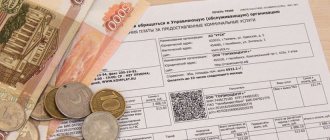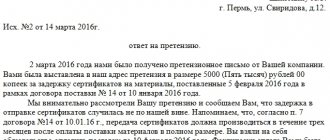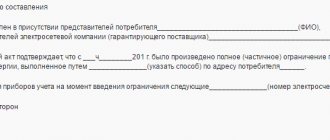Grounds for recalculation provided for by law
In accordance with subparagraphs “a” and “d” of paragraph 31 of the Rules for the provision of utility services to owners and users of premises in apartment buildings and residential buildings, approved. Decree of the Government of the Russian Federation dated 06.05. 2011 No. 354 (hereinafter referred to as Rules No. 354), the performer is obliged to:
- provide the consumer with utility services in the volumes required and of appropriate quality in accordance with the requirements of the legislation of the Russian Federation, the specified rules and the agreement containing provisions on the provision of utility services;
- if there are grounds, recalculate the amount of payment for utility services, including in connection with the provision of utility services of inadequate quality and (or) with interruptions exceeding the permissible duration.
By virtue of Part 4 of Article 157 of the Housing Code of the Russian Federation, as a consequence of the provision of utility services with interruptions exceeding the permissible duration and (or) with a violation of quality, a change in the amount of payment for utility services is provided (implemented in the manner established by the Government of the Russian Federation in Rules No. 354).
In turn, paragraph 98 of Rules No. 354 determines that if a utility service of inadequate quality and (or) with interruptions exceeding the established duration is provided to the consumer during the billing period, the amount of payment for such utility service is subject to reduction until complete exemption from payment for such service .
According to paragraph 150 of Rules No. 354, a contractor who has committed a violation of the quality of provision of a utility service due to the provision of a utility service to a consumer of inadequate quality and (or) with interruptions exceeding the established duration, is obliged to recalculate to the consumer the amount of payment for such a utility service in the direction of its reduction.
Conclusion
Thus, from the above standards it follows that the need to recalculate the amount of fees is associated with the fact of providing low-quality utility services.
Checking the validity of the notification
The rules for the provision of utility services allow 2 hours to carry out an inspection, unless there are other force majeure circumstances. Afterwards, an act is drawn up, which either confirms the violations or refutes them. The number of copies must match the number of interested parties. When someone refuses to sign a document, the remaining participants and an additional two uninterested persons sign.
If you disagree with the conclusions, any of the participants can initiate an examination procedure. The costs will be borne by the contractor, but if the facts are not confirmed, the consumer will compensate the resource supplying organization for the costs incurred. After the examination, all participants receive its results from the utility company within 3 days.
Identification by the contractor of the provision of low-quality services is the basis for recalculation
The procedure for establishing the fact of provision of utility services of inadequate quality and (or) with interruptions exceeding the established duration is regulated by Section X of Rules No. 354.
This procedure provides, incl. and an algorithm for the contractor’s actions in the event of independent detection of the provision of utility services of inadequate quality.
Thus, according to paragraphs 104, 107, subparagraph “a” of paragraph 111 of Rules No. 354, the date and time from which it is considered that the utility service is provided with violations of quality is, in particular:
- date and time of discovery by the contractor of the fact of violation of the quality of the utility service to all or part of consumers (indicated by the contractor in the log of such facts);
- date and time of the beginning of the violation of the quality of public services, which were recorded by a collective (community), common (apartment), individual metering device or other measuring device that is intended for these purposes and is used in accordance with the requirements of the legislation of the Russian Federation on the uniformity of measurements (if specified metering devices and measuring instruments are capable of storing recorded information).
Accordingly, the obligation of the utility service provider to recalculate the fee is associated not only with any active actions (for example, with an application) of the service consumer, but also with the independent identification of the fact of the provision of a utility service of inadequate quality.
This connection is partly confirmed by paragraph 22 of the resolution of the Plenum of the Supreme Court of the Russian Federation dated June 27, 2017 No. 22 “On some issues of consideration by courts of disputes regarding payment for utilities and residential premises occupied by citizens in an apartment building under a social tenancy agreement or owned by them.”
From its contents it follows that when resolving disputes regarding the recalculation of payments for utility services of inadequate quality and (or) with interruptions exceeding the established duration, the fact of improper provision of utility services can be confirmed not only by an act of violation of quality or exceeding the established duration of the interruption drawn up by the utility service provider provision of services or an act of non-provision or provision of public services of inadequate quality, but also by any other means of proof.
Conclusion
Thus, the declarative procedure for recalculating fees when providing low-quality services to the consumer is not the only possible one. The contractor’s obligation to recalculate the fee may be related to other grounds (not related to the consumer’s application), incl. and with independent identification of the fact of provision of services of inadequate quality.
Performer actions
When the contractor itself, the housing and communal services company, discovers a discrepancy, the following actions are taken:
- the fact is recorded in a special journal - date, time, reasons, if they are established;
- if the reasons are unknown, takes measures to clarify them;
- consumers are informed about the identified causes and the planned period of time for elimination;
- Once the discrepancies are resolved, the date and time are recorded and again recorded in the log.
The time specified by the contractor is the period of low-quality delivery, if there was a discrepancy between the supplied resource and the standards.
Inadequate provision of public services: features of the claim act
After the application is written, it is submitted to the organization that provides housing and communal services. The employee who receives it must put his signature and the current date. The application review period is one month. If the appeal remains unanswered, you can seek help from the court to protect consumer rights. In general, it is recommended to carefully check the format of the document before submitting it to the housing and communal services organization.
Let's look at some cases during which it is possible to file a claim:
- turning off water or light higher than what was stated;
- low water temperature in the water supply or batteries;
- low or very high voltage in the electrical network.
It must be borne in mind that if the standards by which payment is made are exceeded, then this can only mean dishonesty on the part of the housing and communal services organization. All violations by this company must be taken into account in the submitted document.
Recalculation of the lost volume of services
The invoice includes services for the provision of a certain volume of resource for use, which are calculated according to the following indicators:
- established consumption standards;
- number of users living in the apartment;
- apartment area;
- service delivery time.
In the event of a shortfall in receiving a certain amount of services, the consumer takes into account the above factors and determines the amount by which the total rent for housing should be reduced. A claim for improper provision of housing and communal services is drawn up, listing the violations, and submitted to the housing inspectorate (read the link about the deadline for responding to a consumer complaint).
Current standards
The Public Utilities Law establishes:
- permissible duration of interruptions in the provision of healthcare;
- permissible deviations from the proper quality of the CU;
- conditions and procedure for recalculating utility bills for utility services provided with non-compliance with the permissible duration of interruptions and deviations from proper quality.
The requirements are established according to the following CG (Appendix 1 to the Rules approved by Resolution 354):
- cold and hot water supply;
- drainage;
- electricity supply;
- gas supply;
- heating;
- removal of solid municipal waste.
How to force a fee reduction
If the housing or resource supplying organization has not independently recalculated the relevant payments, then the consumer must draw up and submit a claim in which he refers to the grounds that have arisen. The document is delivered to the organization in person or sent by mail.
If the utility companies have not responded in any way, the consumer can then apply to the court or other organizations that control the work of utility companies - the Housing Inspectorate, Rospotrebnadzor or the prosecutor's office - to protect their rights. To do this, write a statement and attach to it copies of available documents proving the consumer’s case.
How can I get my money back?
So how can we achieve justice and return the money we pay for poor quality services provided to us by housing and communal services?
And you need to prepare in advance.
We will record a quality discrepancy
First of all, we need to call a representative of the organization that provides us with a service whose quality does not suit us.
This can be done by making a phone call to the organization's dispatch service or writing a corresponding statement.
In the application you must indicate your contact information, surname, initials, address, as well as the essence of the complaint itself.
The dispatcher of this service is obliged to record our request, provide the number of this application, as well as the surname and initials of the employee who accepted it.
If you decide to leave the application in writing, then it is better to do it in two copies, one of which must be presented to the representative of the emergency dispatch service, and on the second copy you must ask for a note of acceptance.
You can also send your application by registered mail, with acknowledgment of receipt.
Thus, we will have indisputable evidence of contacting this organization with a problem.
A representative of this organization (most often this is a foreman) is obliged to appear within two days and record a deviation from the established standards, if any, and also draw up a report.
The act must necessarily indicate the fact of the violation and the time during which it was not eliminated.
The act, like the application, should be drawn up in two copies, so that in the future you will have the necessary evidence on hand.
If you do not agree with the assessment of the violation, you can request a quality assessment.
If a representative of the organization we need does not come or refuses to record the violation, our next step will be to contact public organizations that protect consumer rights, or draw up an act ourselves, obtaining the signatures of witnesses (this could be neighbors).
There must be at least two witnesses. And in both cases, the act should be certified by a representative of this public organization.
Let's make a demand
After drawing up the act, we must make a written request addressed to the organization providing us with these services.
This statement must describe the request to eliminate the discrepancy and reimbursement for the penalty.
Based on this requirement, the organization that provides us with services is obliged to either recalculate utilities or refuse to recalculate.
In case of refusal, the organization must justify in writing why the recalculation was refused.
If the organization does not respond to this requirement or the refusal is not sufficiently reasoned, then the next action will be to go to court.
Please note that you need to pay for housing and communal services in any case, but if a report is drawn up on the non-compliance of the service with standard indicators, in the future the funds paid for low-quality services will be reimbursed.
Armed with knowledge of the regulatory indicators established by current legislation, you can defend your consumer rights. There is no point in overpaying for something that is not actually provided to us.
Do not forget that it will be more reliable and effective to prepare all statements, complaints and demands in writing in duplicate.
Request that your copy be certified by the signature of the representative who accepted the application or drew up the act.
It should also indicate the name and position of this representative, the entry number and the date of receipt of the application or drawing up the act.
If consumers begin to defend their rights en masse, then perhaps the quality of services provided by housing and communal services will increase.
And then the quality of our lives will certainly increase.
What standards for the provision of housing and communal services are provided for by law?
Standard heating indicators
Throughout the entire heating season, heating of the premises must be carried out around the clock and uninterruptedly.
It is worth considering that the temperature during this period in the living room cannot be lower than +18 °C (in corner rooms this figure increases by 2 °C).For regions with typically low air temperatures in winter (below 31 °C), this temperature indicator should be at least 20 °C.
It is also worth paying attention to the fact that the pressure in the intra-house system with cast iron radiators should be no more than 0.6 MPa, as for panel heating systems, convector heating systems, as well as heating with air heaters, this figure is no more than 1 MPa.
Electricity supply
According to the standards, power supply must be uninterrupted and constant.
Voltage must meet federal standards.
It is unacceptable to interrupt the power supply if this could lead to the shutdown of equipment that ensures the operation of the in-house utility network, as well as the safety of the living conditions of the population.
Gas supply norm
The gas pressure in the network must be no less than 0.003 MPa and no more than 0.005 MPa.
The gas supply must be uninterrupted.
The properties and pressure of the gas must strictly comply with federal standards.
Cold water supply standards
Cold water must comply in composition with current sanitary standards.
The water supply must be constant and uninterrupted, and the pressure in the residential building system must be from 0.03 to 0.6 MPa.
Remember
Analyzing the presented court decisions in favor of management organizations in disputes with RSO about the quality of services provided, the following conclusions can be drawn:
- If it is revealed that the RSO has provided services of inadequate quality, the MA must draw up a report or record in any other way evidence of the service provider’s guilt.
- If necessary, the MA should conduct an examination of the supplied resource at the border of the balance sheet of the networks.
- If it is technically possible, the MA needs to record violations of the quality of services using the ODPU, the readings of which the RSO accepts for calculations.
If it can be proven that the resource supplier provided services of inadequate quality, the management company may refuse to pay for the supplied resources and demand that the RSO compensate for the damage caused to the property of the owners.









